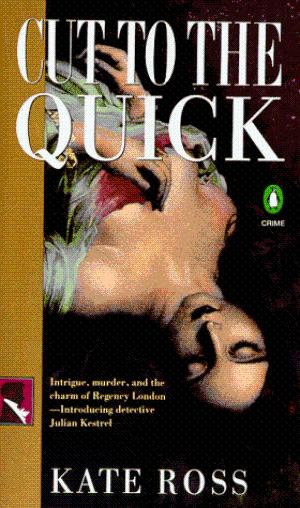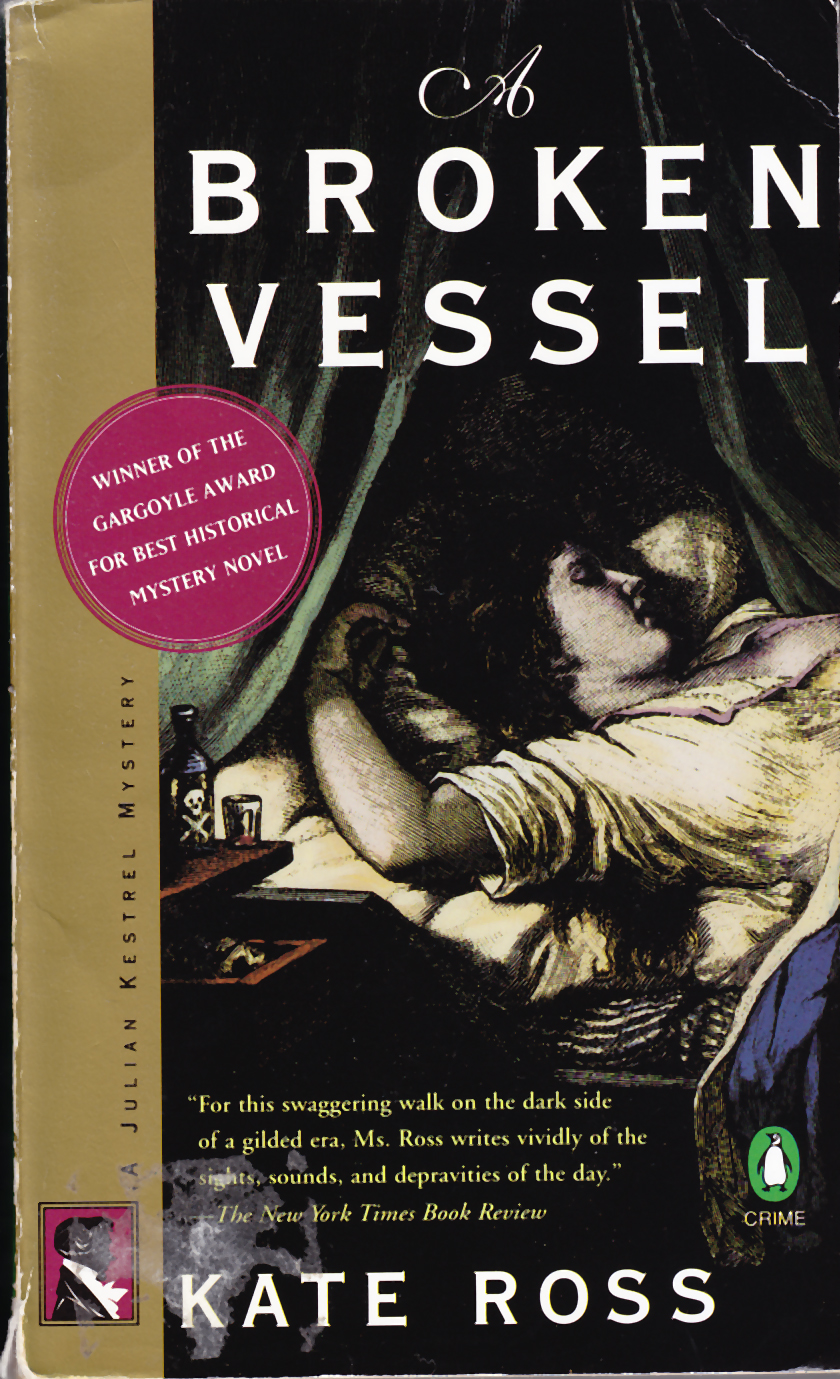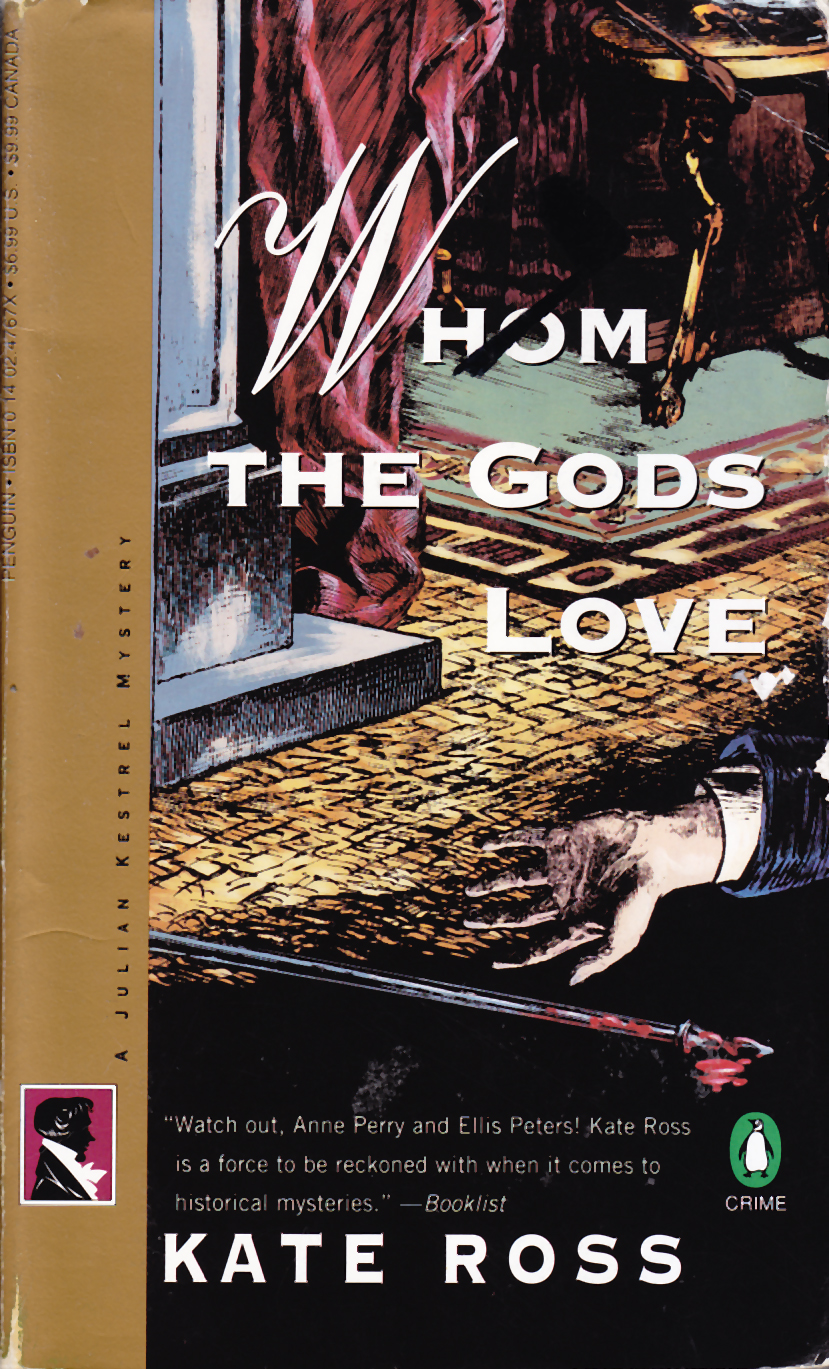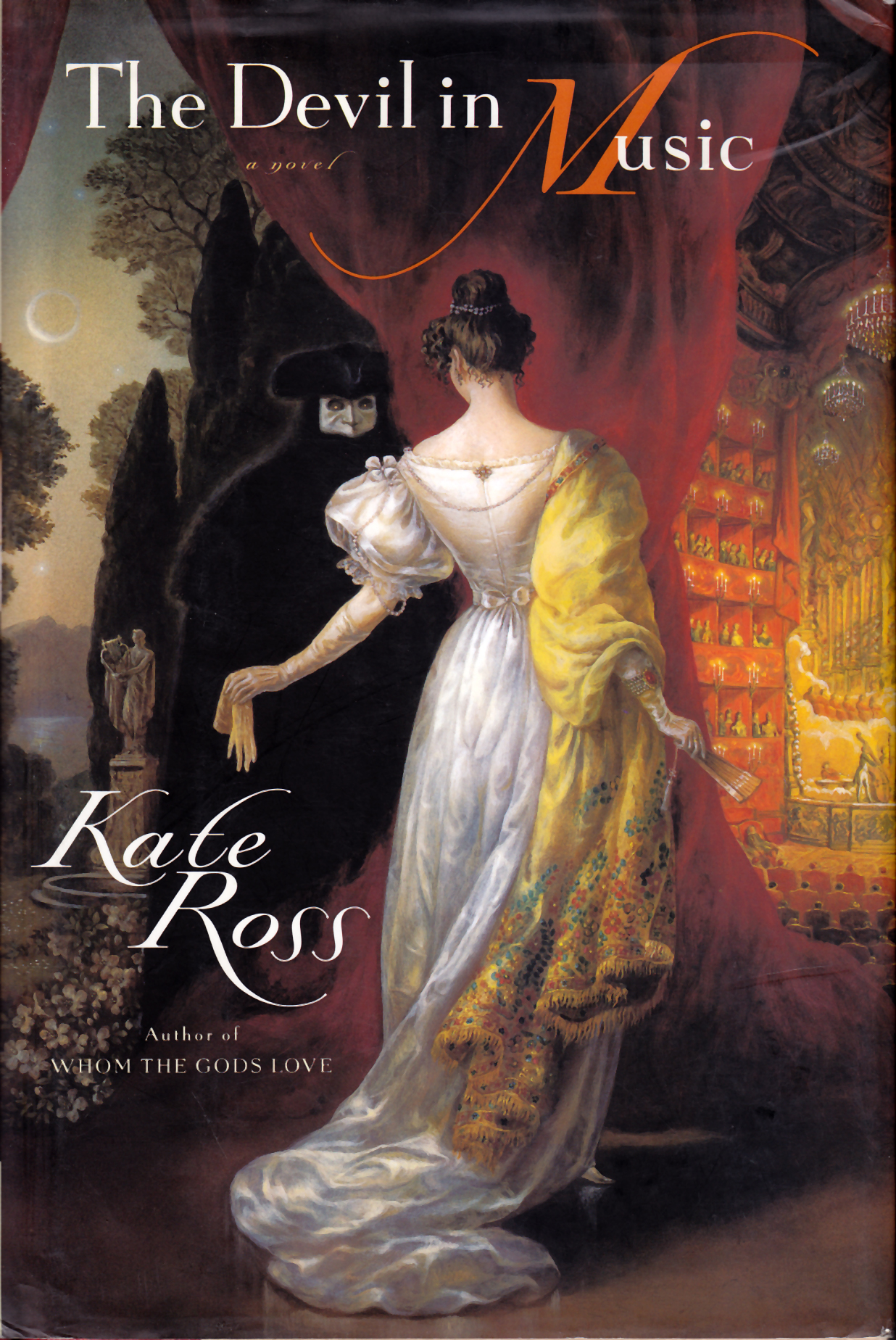Kate Ross
Books: Mystery | Historical
Julian Kestrel: Cut to the Quick (1993), A Broken Vessel (1994), Whom the Gods Love (1995), The Devil in Music (1997)
Anthologies
Crime Through Time (1997)
It's hard to believe that there are only four Julian Kestrel books. I was sad to learn that Kate Ross died so young, because her books are well-written, fun, and there should have been many, many more of them.
If you like historical mysteries, I cannot recommend these four books highly enough. Read them in order, and try to take the time to savor them, because this is all there is.
Julian Kestrel
Cut to the Quick (1993)
Reading the T. F. Banks books put me in the mood for another Victorian mystery, and lucky for me, I had one waiting here to read.
Julian Kestrel is a dandy. He's making his mark on London society by being a sharp dresser, and the perfect gentleman--even if he doesn't actually seem to be a gentleman. By chance, one evening at his club he manages to save a young gentleman from ruin an embarrassment--only to discover two weeks later that he is to be a groomsman in the young man's impending wedding. A wedding about which the young man did not seem entirely enthused to say the least.
I very much enjoyed reading this book. The writing was good, the dialog was sharp, and the mystery was excellent. I constantly kept revising who I thought the murderer was, and every time I thought I had it, Kate Ross would pull the rug out from under me, and I'd have to start all over again. (Mind you, as much as I love mysteries, I'm not the best at guessing whodunit--I read too quickly to spend the time to consider all the possibilities.)
But the mystery was definitely the best thing about this books. Well done, reasonable, and with plenty of misdirection.
Julian Kestrel is wonderful character, and I enjoyed learning the little bits of his past that were dribbled out, as well as seeing his interactions with the other characters, as well as watching him solve the mystery. And I especially enjoyed his interaction with Hugh's younger sister, Philippa. It's too bad that we won't be seeing more of her in future books, because she was an absolute delight. (I suppose we could see more of her, but it would be a heck of a contrivance if we did.)
Consider the following exchange between Julian and Philippa:
"If everyone who died with unpunished sins on his conscience came back as a ghost, the living would be crowded out of every home in England."
"You're cynical. I thought you would be. Can you sneer?"
"With terrifying effect."
"Oh, do it, please! I want to see it!"
"I'm afraid you're much too young to withstand it. I should be accused of stunting your growth--perhaps even sending you into a decline."
"I wouldn't go into a decline. I'm robust. My governess says so."
That just cracks me up. As well as:
"I'm sorry about that," muttered Hugh. "I don't suppose you came to Bellegarde to be teased to death by my little sisters."
"Oh, I don't mind. I rather like making friends with women before they're old enough to be dangerous."
More the fool him though. We're dangerous from a very young age.
The relationship that developed between Dr MacGregor and Julian Kestrel was also very interesting, as the doctor came to see the Julian Kestrel that we'd been seeing through his thoughts, instead of the image he projected to society. I very much hope that relationship will be continued in future books. (And I know there are future books, because I just ordered them.)
Additionally, having just finished a Victorian mystery featuring a Bow Street Runner, it was interesting to see how they were viewed from the outside. It was also interesting how the two stories complemented each other, in their portrayal of London society at the time.
I can't wait to loan this to my grandmother, and have high hopes for further Julian Kestrel mysteries.
Published by Felony & Mayhem Press
- June 2006 | Rating: 8/10
- May 2010 | Rating: 9/10
- February 2015 | Rating: 10/10
- April 2021 | Rating: 10/10
A Broken Vessel (1994)
The second Julian Kestrel mystery, A Broken Vessel looks at prostitution in 1800s London, and the Reclamation houses that existed to recover these women. Julian is introduced to this world through his manservant Dipper, who discovers his lost sister, who is working as a ladybird.
One of the most interesting things about this book is the language. Dipper and his sister both speak a patois that is distinctly different from how Julian speaks, and their vocabulary is that of the streets. However, Kate Ross wrote the dialog so that the slang is understandable, which is quite impressive.
"He kept a shop, I could tell by his duds. He was very natty--wore a clean white crumpler, with his gills standing up all straight and neat." She held up her forefingers, imitating the corners of a turned-up collar.
I really enjoyed how the language changed from character to character, and the descriptions of the clothes and the world at that time. She did a good job of making those things interesting, without sounding like she was explaining. Julian is just as witty in this book as he was in the previous--maybe even more so, which I very much enjoyed. I'm a big fan of witty banter, and Julian's banter (when he's in a bantering mood) is fun.
The mystery was also interesting. They had too much information to put the puzzle together, which made what should have been a simple purloined letter mystery far more difficult. However, I'm not sure that the mystery wasn't a little too confusing. All the pieces were there, but I'm not sure how easy it would be to put all the pieces together and make sense of the whole thing. They were there, and they made sense in retrospect, but wow. I certainly wasn't expecting how things turned out.
This book takes a deep and unpleasant look at prostitution in Regency London.
He was told she had not been seriously ill, but merely weak and in low spirits— perhaps a debilitating effect of the depraved life she had led before she came to the refuge.
Of course why women end up prostitutes was as complex then as it is today.
"Self-respect’s a fine thing, sir, but you can’t eat it, nor drink it, nor put a red feather on it and tie it under the chin."
Mr. Harcourt then questioned her closely about how she fell from grace. She was hard put to answer. She could not remember a moment when she fell. She had been born about as low as a girl could get, and simply went on from there.
The surprise for me in this book was the amount of sex. Okay, so the main characters (aside from Julian Kestrel and Dipper) were prostitutes, but I still wasn't expecting quite that much sex. I think the book should still be okay for my grandmother--although I will warn her.
Another very good story, and the writing was again excellent. You should be able to read this story without having read the first, although I think some of the passages were better with knowledge of the events of the previous book. Of course, that's almost always the case, isn't it?
Published by Felony & Mayhem Press
- June 2006 | Rating: 8/10
- May 2010 | Rating: 9/10
- February 2015 | Rating: 10/10
- April 2021 | Rating: 9/10
Whom the Gods Love (1995)
Alexander Falkland has been killed. His head smashed in with a poker while one of his famous parties rages upstairs. But Alex is the darling of the ton (it took me awhile to figure this one out; the ton is the bon ton, or high society in London) and no one has the faintest idea who would have wanted to kill him. So Malcolm Falkland, Alexander’s father, hires Julian Kestrel to assist Bow Street in this investigation, believing that the darlings of society will talk to Alexander when they wouldn’t talk to Bow Street.
I really like Julian Kestrel. He’s smart, he’s witty, and he actually cares about people, as much as he tries to hide it. I also like how he works with Bow Street. Because he has worked so hard to become a part of society, he cannot become a Bow Street runner, yet his inside connection to society is precisely what Bow Street needs to help solve the crime. Interestingly, similar arguments are made here, as in the books by T.F. Banks, that Bow Street would eventually have to be replaced by a regular police force. And as in those books, you can see how Bow Street lacked the authority to properly fight crime in Regency England. In this case, because they lacked the respect of higher society, they were unable to make much headway into the murder.
Perhaps because we saw so much of him in the last book, Dipper is only a minor character in this book. After all, the victim was a member of society, so other than listening for rumors, there wasn’t a lot he could do. However, to make up for that, we learn that Julian has continued a friendship through letters with Philippa Fontclaire (Cut to the Quick).
As with the previous two books, I very much liked everything about the writing of Whom the Gods Love. I loved the dialog, the story moved quickly, and the mystery was very good. I’d guessed parts of the mystery, however, other parts were a complete surprise, which is how a good mystery should be. And it was only slightly frustrating when Julian would muse on some conclusion he’d drawn, and not share.
I also loved her description of Regency London. How women could be trapped into bad situations, how men could get themselves into trouble financially trying to remain fashionable, how mistresses and prostitutes were an acceptable part of society. I find it all fascinating, and I love the language and tone. And then there’s the fact that they party all night and sleep all day. Dinner at a party was to be served at one in the morning, and no one thought this strange. And people complain nowdays about bars being open until two in the morning? Modern college students have nothing on the high society set of Regency London.
Like the previous book, A Broken Vessel there is some sex in the story, however it occurs in the background, and is not described explicitly, so I should be okay to loan this book to my grandmother. However, like A Broken Vessel, the secrets that come out are ugly and unpleasant.
If you like Victorian mysteries, then I strongly recommend Kate Ross. Although you could probably pick this book up and be fine, I think it would be preferable to start the series from the beginning, and watch Julian grow beyond the simple dandy he appears at the start of the first book.
There are only four books, so I recommend reading them in order. And I mourn the early death of Kate Ross, and the fact that I have only one Julian Kestrel mystery left to read. How awful that such a wonderful voice was silenced so early.
Published by Felony & Mayhem Press
- June 2006 | Rating: 8/10
- March 2015 | Rating: 9/10
- May 2021 | Rating: 9/10
The Devil in Music (1997)
Four years previously, Lodovico Malvezzi died of a heart attack. Now, four years later, it comes out that he was actually murdered, but local officials covered up the murder in fear it would encourage the revolutionaries, who it was believed were behind the plot. However, on her deathbed, the woman who prepared the body confesses it was murder, and the case is reopened. Julian, traveling with Doctor MacGregor, offers his services to the family in solving the murder.
As always when reading historicals, I am struck by how different the world is now.
Demanding a constitution! Any idiot ought to be able to see that a ruler could not apply the same laws to everyone—nobles and peasants, enemies and friends.
"It isn’t a crime for a man to guard his privacy," Carlo declared.
"On the contrary, Signor Conte," Grimani said sternly, "no one within the realm of His Imperial Majesty Francis the First of Austria is entitled to keep his name, activities, or opinions secret."
There is also a rather distressing reminder of the rights–or rather lack thereof–of women at that time period. Which serves to remind me how glad I am to live in the future."These Bow Street Runners are not police. As I understand it, they work for hire, and their power is greatly restricted."
"If you mean that they can’t make a search or arrest without cause, that’s true," said Julian.
"Our police are more efficient," said Grimani. "They make the search or arrest in order to find the cause."
Damn near perfect.
Go read the entire series, starting with Cut to the Quick.
Published by Felony & Mayhem Press
- June 2006 | Rating: 10/10
- March 2015 | Rating: 10/10
- July 2021 | Rating: 9/10
Anthologies
Crime Through Time (1997) edited by Miriam Grace Monfredo and Sharan Newman
- "Death of a Place-Seeker" by Lynda S. Robinson
- "Archimedes’ Tomb" by Steven Saylor
- "Solomon’s Decision" by Sharan Newman
- "Murder at the Anchor" by Edward Marson
- "The Hangman’s Apprentice" by Leonard Tourney
- "Suffer a Witch" by Miriam Grace Monfredo
- "The Lullaby Cheat" by Kate Ross
- "Anything in the Dark" by Edward D. Hoch
- "Bertie and the Boat Race" by Peter Lovesey
- "The High Constable and the Visiting Author" by Maan Meyers
- "Look to the Lady" by Alanna Knight
- "Mrs Hudson’s Case" by Laurie King
- "Exit Centre Stage" by M.J. Trow
- "Decision of the Umpire" by Tony Soos
- "Uncle Charlie’s Letters" by Anne Perry
- "Killing the Critic" by Gilliam Linscott
- "Portrait of an Artist as a Young Corpse" by Barbara Paul
- "The Mamur Zapt and the Kodaker’s Eye" by Michael Pearce
- "Storm in a Tea Shoppe" by Carola Dunn
- "The Enemy" by Ken Kuhlken
- "The Soldier and His Dead Companion" by Nicolas A. DiCharico
Published by Berkley Prime Crime





